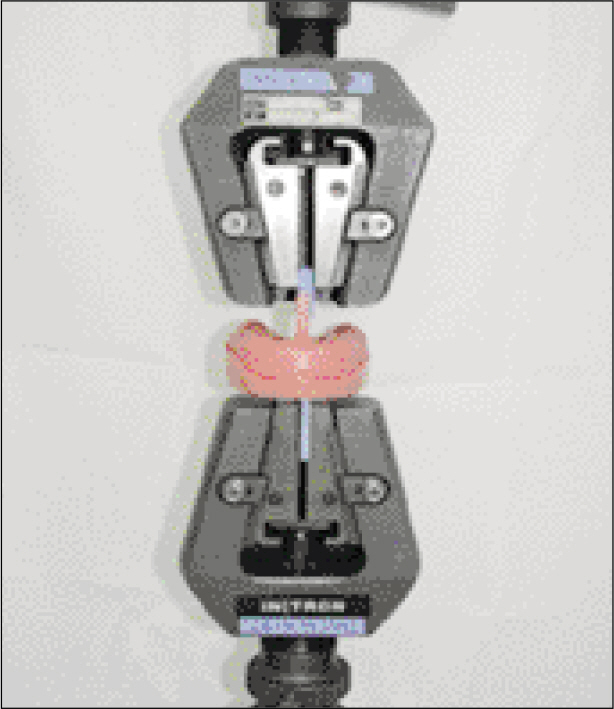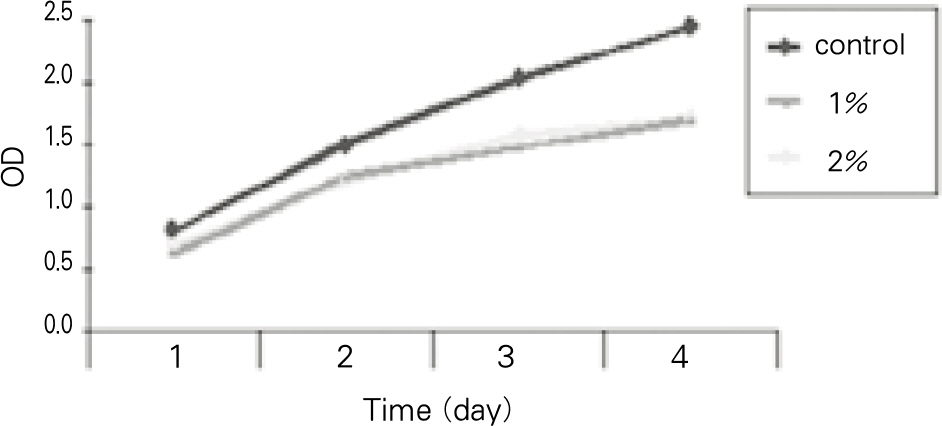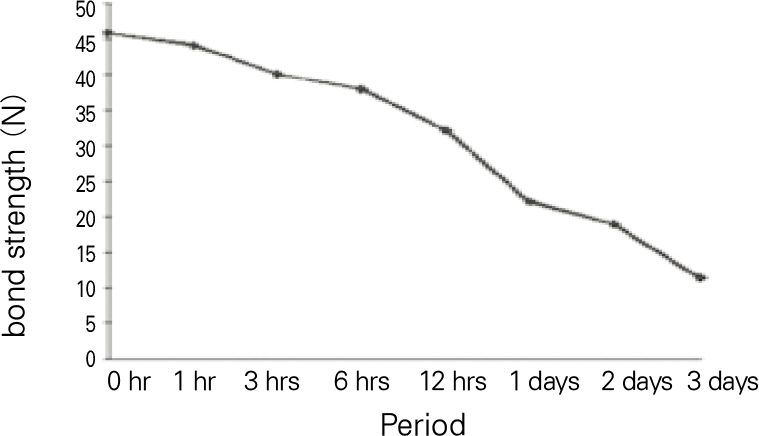J Korean Acad Prosthodont.
2009 Apr;47(2):232-239. 10.4047/jkap.2009.47.2.232.
Evaluation of changes in adhesive strength and cytotoxicity of a denture adhesive according to time
- Affiliations
-
- 1Department of Prosthodontics, College of Dentistry, Yonsei University, Korea. hsm5@yuhs.ac
- KMID: 2195621
- DOI: http://doi.org/10.4047/jkap.2009.47.2.232
Abstract
- STATEMENTS OF THE PROBLEM: Many denture wearers occasionally use denture adhesives to improve denture retention, stability and chewing efficiency. An ideal denture adhesive is nontoxic, non-irritating, and provides comfort to the oral mucosa. PURPOSE: The purpose of this study was to evaluate the cytotoxicity and adhesive properties of a selected denture adhesive. MATERIAL AND METHODS: To test cytotoxicity of the selected denture adhesive, mouse fibroblast cells were used in MTT testing. Cytotoxicity was examined according to the concentration of the denture adhesive and incubated for 1 to 4 days. To examine adhesive property, a denture base was fabricated on an edentulous dentiform. The adhesive was applied to the denture base, then tensile bond strength was measured, to evaluate the change in retention during 3 days. RESULTS AND CONCLUSION: 1. 1% and 2% concentration denture adhesive cream had no cytotoxicity. 2. The tensile bond strength of the group with both denture adhesive and artificial saliva was significantly higher than that of the group with only denture adhesive (P < .05). The tensile bond strength of the group with denture adhesive was significantly higher than that of with only artificial saliva (P < .05). 3. The tensile bond strength had no significant change during 1 hour, and then gradually decreased. After 1 day, it decrease to half. Within the limitation of this study, the tested denture adhesive had no cytotoxicilty and was effective in improving denture retention. The adhesive strength began to continuously decrease after 1 hour and it decreased to half at 1 day after application.
MeSH Terms
Figure
Reference
-
1.Chew CL., Boone ME., Swartz ML., Phillips RW. Denture adhesives: their effects on denture retention and stability. J Dent. 1985. 13:152–9.
Article2.Grasso JE. Denture adhesives. Dent Clin North Am. 2004. 48:721–33. vii.
Article3.Grasso JE. Denture adhesives: changing attitudes. J Am Dent Assoc. 1996. 127:90–6.
Article4.Norman RD., Stewart GP., Maroso DJ., Gephart JS., Kohut BE. In vitro measurement of vertical denture displacement by denture adhesives. Dent Mater. 1987. 3:342–6.5.Adisman IK. The use of denture adhesives as an aid to denture treatment. J Prosthet Dent. 1989. 62:711–5.6.DeVengencie J., Ng MC., Ford P., Iacopino AM. In vitro evaluation of denture adhesives: possible efficacy of complex carbohydrates. Int J Prosthodont. 1997. 10:61–72.7.Chew CL. Retention of denture adhesives—an in vitro study. J Oral Rehabil. 1990. 17:425–34.8.Fl � ystrand F., Koppang R., Williams VD., Orstavik J. A method for testing denture adhesives. J Prosthet Dent. 1991. 66:501–4.9.Al RH., Dahl JE., Morisbak E., Polyzois GL. Irritation and cytotoxic potential of denture adhesives. Gerodontology. 2005. 22:177–83.
Article10.Gerrard WA., Winter PJ. Evaluation of toothpastes by their ability to assist rehardening of enamel in vitro. Caries Res. 1986. 20:209–16.11.Koppang R., Berg E., Dahm S., Real C., Fl � ystrand F. A method for testing denture adhesives. J Prosthet Dent. 1995. 73:486–91.
Article12.Ciapetti G., Cenni E., Pratelli L., Pizzoferrato A. In vitro evaluation of cell/biomaterial interaction by MTT assay. Biomaterials. 1993. 14:359–64.13.Zhao K., Cheng XR., Chao YL., Li ZA., Han GL. Laboratory evaluation of a new denture adhesive. Dent Mater. 2004. 20:419–24.
Article14.Ellis B., Al-Nakash S., Lamb DJ. The composition and rheology of denture adhesives. J Dent. 1980. 8:109–18.
Article
- Full Text Links
- Actions
-
Cited
- CITED
-
- Close
- Share
- Similar articles
-
- Use biologic fibrin adhesive in otologic surgery: compared with ammonium sulfate fibrin adhesive and tissell®
- Effect of applying adhesive after enamel etching on the shear bond strength of orthodontic brackets using light curing resin cements
- The effect of adhesive thickness on microtensile bond strength to the cavity wall
- Effect of surface treatment on shear bond strength of relining material and 3D-printed denture base
- An investigation into the effect of denture adhesives on incisal bite force of complete denture wearers using pressure transducers: a clinical study






